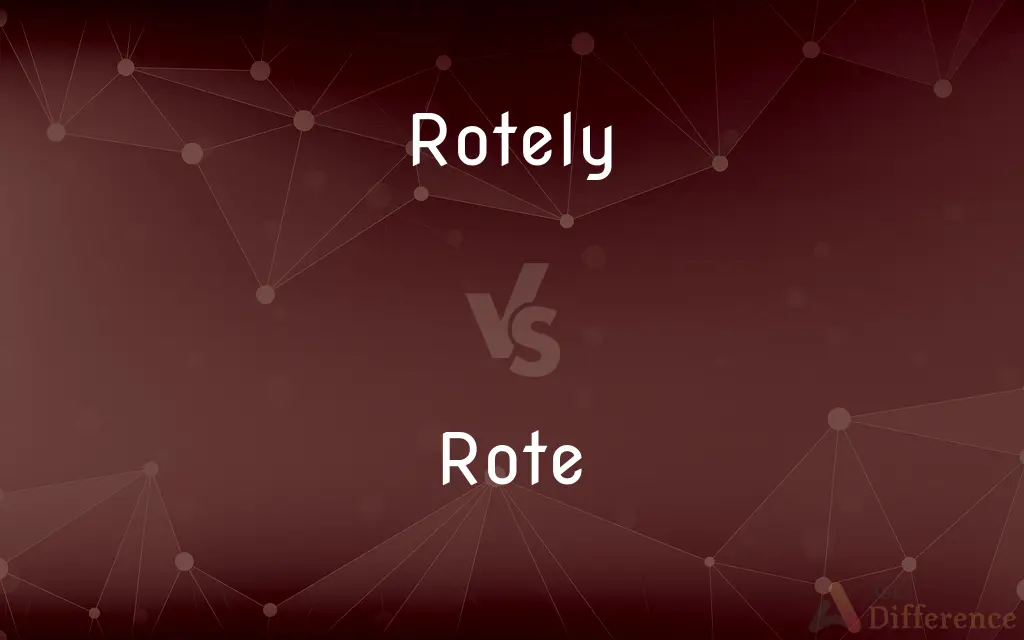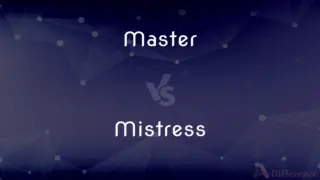Rotely vs. Rote — What's the Difference?
By Fiza Rafique & Maham Liaqat — Updated on April 24, 2024
Rotely refers to performing tasks mechanically without thought, while rote involves memorizing through repetition without understanding the underlying meaning.

Difference Between Rotely and Rote
Table of Contents
ADVERTISEMENT
Key Differences
Rotely involves the mechanical or habitual performance of a task, usually without any deep understanding or engagement. Whereas rote focuses specifically on the method of learning or memorizing where repetition is the key strategy.
Rotely often describes the way a task is executed, highlighting a lack of thought and creativity. On the other hand, rote learning is a technique used particularly in educational contexts, implying memorization of information by repeated exposure.
Rotely can apply to any repetitive activity in daily life or work that becomes automatic. While rote is more often associated with academic settings, where learners repeat information until it can be recalled from memory effortlessly.
Rotely implies a certain disengagement from the process, suggesting that the activity is done automatically. Whereas rote learning, though sometimes criticized, can be effective for certain types of information that require exact recall.
Rotely execution of tasks often leads to minimal personal investment or innovation in the activity being performed. On the other hand, rote memorization, despite its limitations,
ADVERTISEMENT
Comparison Chart
Definition
Performing tasks mechanically without thought
Memorizing through repetition without understanding
Usage Context
General tasks, daily activities
Educational, learning contexts
Engagement Level
Low, automatic
Low, focused on repetition
Purpose
Efficiency, habituation
Memorization, recall
Implication for Creativity
Minimal, discourages innovation
Limited, focuses on recall not understanding
Compare with Definitions
Rotely
Unimaginatively, without initiative.
The employee performed his duties rotely, never offering new ideas.
Rote
Learning or memorization by repetition.
He learned the equations by rote for his math exam.
Rotely
Mechanically or unthinkingly following a procedure.
She completed the forms rotely, not paying attention to the details.
Rote
Unthinking repetition that does not involve comprehension.
They practiced the drills by rote, not understanding the reasons behind them.
Rotely
Automatically, without active thought or consideration.
They went through their morning routine rotely.
Rote
A routine or fixed, unvarying procedure.
The training was conducted by rote, leaving no room for questions.
Rotely
Habitually, without variation.
He answered the questions rotely, having given the same responses many times before.
Rote
Mechanical or habitual repetition.
She gave the safety instructions by rote, as if reading from a script.
Rotely
Repetitively, without engagement.
The lecture was delivered rotely, dulling the interest of the students.
Rote
Repetition of words or sounds from memory with little understanding.
The child recited the poem by rote.
Rotely
By rote, in rote fashion; machine-like.
Rote
A memorizing process using routine or repetition, often without full attention or comprehension
Learn by rote.
Rote
Mechanical routine.
Rote
The sound of surf breaking on the shore.
Rote
A medieval stringed instrument variably identified with a lyre, lute, or harp.
Rote
Mechanical routine; a fixed, habitual, repetitive, or mechanical course of procedure.
The pastoral scenes from those commercials don’t bear too much resemblance to the rote of daily life on a farm.
He could perform by rote any of his roles in Shakespeare.
Rote
(rare) The roar of the surf; the sound of waves breaking on the shore.
Rote
(musical instrument) A kind of guitar, the notes of which were produced by a small wheel or wheel-like arrangement; an instrument similar to the hurdy-gurdy.
Rote
Synonym of crowd.
Rote
By repetition or practice.
Rote
(obsolete) To go out by rotation or succession; to rotate.
Rote
(transitive) To learn or repeat by rote.
Rote
A root.
Rote
A kind of guitar, the notes of which were produced by a small wheel or wheel-like arrangement; an instrument similar to the hurdy-gurdy.
Well could he sing and play on a rote.
Extracting mistuned dirges from their harps, crowds, and rotes.
Rote
The noise produced by the surf of the sea dashing upon the shore. See Rut.
Rote
A frequent repetition of forms of speech without attention to the meaning; mere repetition; as, to learn rules by rote.
Till he the first verse could [i. e., knew] all by rote.
Thy love did read by rote, and could not spell.
Rote
To learn or repeat by rote.
Rote
To go out by rotation or succession; to rotate.
Rote
Memorization by repetition
Common Curiosities
Can rotely be considered a positive approach?
Typically, performing tasks rotely is viewed negatively as it suggests a lack of engagement and creativity.
How does rote learning work?
Rote learning involves memorizing information through repetition, focusing on recall rather than understanding.
What types of information are best learned by rote?
Information that requires exact memorization, such as formulas, dates, or sequences, is often best learned by rote.
Is rote learning beneficial for all subjects?
Rote learning is not typically beneficial for subjects that require problem-solving or critical thinking, as it focuses on memorization without understanding.
What does rotely mean?
Rotely refers to doing something in a mechanical or habitual way, often without conscious thought or awareness.
How does rote learning impact long-term knowledge retention?
Rote learning can sometimes lead to quick forgetting unless reinforced regularly, as it often lacks connections to deeper understanding.
Is there a specific context where rotely is more acceptable?
Rotely performing tasks can be suitable in scenarios where speed and habitual execution are more critical than innovation or deep understanding.
What is a common misconception about rotely?
A common misconception is that tasks performed rotely always involve simplicity or ease, which isn't necessarily true.
Why might someone choose to perform tasks rotely?
Efficiency or the need to complete routine tasks without expending much mental effort can lead someone to perform tasks rotely.
What are the advantages of rote memorization?
Rote memorization can be effective for mastering basic facts and figures that require exact recall.
How do educators view rote learning?
While effective in some contexts, rote learning is often critiqued for not fostering deeper understanding or critical thinking skills.
Can tasks be performed both rotely and by rote?
Yes, tasks can be performed rotely and learned by rote, especially when they involve repetitive actions that do not require deep understanding.
Does rotely involve any cognitive effort?
Rotely involves minimal cognitive effort, as tasks are performed automatically.
What can be done to improve tasks performed rotely?
Introducing variability, creativity, or engagement can improve how tasks are performed rotely, making them more effective and enjoyable.
Can rote learning be combined with other learning strategies?
Combining rote learning with strategies that involve understanding and application can enhance overall learning effectiveness.
Share Your Discovery

Previous Comparison
Shape vs. Form
Next Comparison
Master vs. MistressAuthor Spotlight
Written by
Fiza RafiqueFiza Rafique is a skilled content writer at AskDifference.com, where she meticulously refines and enhances written pieces. Drawing from her vast editorial expertise, Fiza ensures clarity, accuracy, and precision in every article. Passionate about language, she continually seeks to elevate the quality of content for readers worldwide.
Co-written by
Maham Liaqat














































